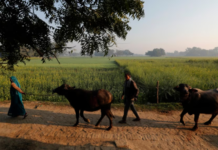By Dr. Shanker Suwan Singh, Columnist and Thinker, Assistant professor, Agriculture University, Prayagraj (Uttar Pradesh)
Environment is part of nature. Nature and environment are complementary to each other. Environment can not be conceived without nature. Nature is made up of two words – Pra and Kriti. Pra means Prakrishti (superior / perfect) and Kriti means creation. The best creation of God, that is, the creation by nature, there is a realization of the creation. The nature that is the origin, which results in the world. The meaning of the whole universe is created by nature itself. The nature is of two types – Natural nature and Human nature. Natural nature consists of five elements – earth, water, fire, air and sky. Human nature consists of mind, intellect and ego. The holy texts of Hindus described in Srimad Bhagavad Gita (seventh chapter and fourth verse) – Bhumiraponalo Vayu: Kha Manowith Rev Cha. Vinnah Prakritarishdha in Ahkar Itiyan. Geeta 7: 4. Meaning: Lord Shri Krishna says in the Gita – Earth, water, light, air, sky, these five elements and mind, intellect and ego – this is my ‘Apara’ nature with eight kinds of distinctions. Hey maha baho! My ‘Para’ Prakritik ko Jaan, which is held by this world, is different from this placental nature. That is to say – these eight types of nature form the entire universe.
It is described in the Vedas that “the body of man is made up of five elements as fire, air, water, earth and sky.” Science also considers these five elements. That is, human body is made up of natural nature. Human existence cannot be envisaged without environment. Human nature like mind, intellect and ego balance or preserve all three environment. The word environment is formed by combining two words is “circumcision” and “covering”. “Circumcision” refers to what surrounds us and “covering” refers to the enclosure that organisms live in. The environment is the collective unit of all the physical, chemical and biological factors that an organism lives in or affect the ecological population and decide their form, life and liveliness. Environmental balance refers to the complete harmony between all biological and abiotic conditions surrounding organisms. Water, forest and land are synonymous with development. As long as there is water, forest and land, human development will continue. Humans take trees and plants to those who leave them, and humans take them to those who leave trees and plants. There is life from water, forest and land. If life does not exist, then development, electricity, roads, etc. will not be of any use. It would not be surprising to say that the health of the community is the wealth of the nation. To conserve water, forest and land, purity of mind is very important.
The mind is part of the internal environment. Water, forest and land are part of the external (external) environment. Every religion has assumed that development is not possible due to natural destruction. Vedic culture has an unbreakable relationship with nature. The entire activity of the Vedic culture is completely forbidden by Prakriti. The Vedas have many verses related to conservation of nature, that is, environment. Vedas emphasize on keeping two types of environment pure – internal and external. All the gross objects are external and the subtle elements inside the body like mind and soul are part of the internal environment. Modern environmental science focuses only on external environmental purification. The Veda clarifies the concept of the environment through the purification of the internal environment such as the mind and soul. All the events that take place in the external environment are the result of the thought taking place in the mind. In the Bhagavad Gita, the mind is said to be extremely fickle – the restless mind: (Bhagavad Gita 6:34).
The external and internal environment are compatible with each other. The more the internal environment, especially the pure mind, the more pure the external environment will become. According to the Vedas, purification of mind is the first step for purification of the external environment. The result of any imbalance in these elements is natural calamities like tsunami, global warming, landslides, earthquakes etc. Each component of nature has been given divine form in Vedas. The first mantra of the first Vedas, the Rigveda, is dedicated to Agni – the high fire-worshiped priest, the yajnasya devamritvijam. (Rigveda 1.1.1) The Ritva is the universal law of the universe. This is called the law of nature. According to the Rig Veda – Satyenottabhita Bhumi: Suryanottabhita Doyo: Trritenadityaasthananti Divi Somo Adhishrita: The Rigveda (10: 85: 1) Spirituality – Gods are also the origin of Ritana and are bound by the law of Ritana. It keeps the Sun in the sky. In the Vedas, Varuna has been called the god of the seasons. Though Varuna is known as Veta (Varunasya Gopah) of water and sea but mainly its main function is to run this universe smoothly. In Rigveda, the entire Vanadevi has been worshiped with flora – Aajnandhin Surbhi Bahvannamadashivalam Pramanam Mrigaanam Matramaranyamishishanis ( Rigveda 10: 146: 6) Bhartharth – Now I worship Vanadevi (Aranyayi) who is full of sweet fragrance and is the mother of all the flora and is a store of food without diligence. In the Chandogya Upanishad, the sage who is ardent with his son Shvetaketu Describing the soul, it is said that trees are filled with the soul and feel happiness and sorrow like humans. In Hindu philosophy, a tree has been compared to the ten sons of man – Sadeupa Samvapi: Daswapi Samohrid:. The basil plant gives the most oxygen to human. Tulsi plant also has many medicinal properties. People are considered to be deities and worshiped regularly because they too give a high amount of oxygen. It is described in Guru Granth Sahib – “Pawan Guru, Pani Pita, Mata Dhat Mahat” means air is given the status of Guru, Pani is the father and mother the earth. Disasters are natural or man-made calamities adversely affect human life.
All disasters are the result of human failure. Disaster-negligence, mistake or failure of system created by human work is called man-made disaster. A natural disaster like a volcano, eruption or earthquake also takes terrible form without human involvement. Do not. Man-made calamity brings disasters like bomb blasts, chemical, biological radiological, nuclear, radiation etc. Corona epidemic is only part of biological disaster. This epidemic has killed millions of people. The corona (covid-19) virus infection is so frightening that it increases the risk of infection due to contact with the victim and his dead body. Due to the spread of covid-19 virus in more and more countries, people are in need of more medical care, due to which disposable face masks and other materials are being used, resulting in increased medical waste. China, for example, is struggling with used face masks and medical waste. Only in Wuhan, China, the amount of medical waste is more than 200 tons a day. During the lock down in the world people have isolated themselves (separate ) As a result, the consumption of electricity has increased. In India, hydropower is generated by storing water at high altitude through electricity dam and passing it through turbine regularly. Hydropower projects in India produce about 22% of electricity. People started consuming water excessively during the Corona Pandemic disaster.
Tapping of water led to a decrease in water conservation. On one side of the corona epidemic, people in lock down Pollution decreased during the stay, the rivers were cleaned, the layer of ozone layer was fixed, etc. things have been successful due to human purification. Corona has been purified by fear of pandemic. If human has been purified then environment has been purified. The same things could be done even after the pandemic does not happen. If human beings are already aware of the environment then no disaster will take a formidable form. This is to say that no matter what the disaster is, it adversely affects human life. Human nature dominates the natural nature. If the mind, intellect and ego are pure then human can control natural disasters and man-made disasters. China is defiled by mind, intellect and ego, so it gave rise to biological disaster. Today, the whole world is facing the brunt of China’s man-made biological disaster. 8 times between 12 April and 29 May 2020, earthquake tremors struck Delhi and The earth in its vicinity was shaken. The earthquake tremors at such a short interval together is not a good sign for human existence and environment.
Recently, Cyclone Amphon formed in Bay of Bengal. May 20 Cyclone Amfan caused the most havoc in India in 2020 in West Bengal and Odisha. This has devastated the homes of the people of West Bengal and Odisha and also caused the loss of people. The neighboring country Bangla country also became a victim of the storm. After the storm storm, on June 3, 2020, around 1 pm, Mahathupan Nisarg 120 km / h. Hit the coastal areas of Maharashtra at a speed of. After 120 years, such a situation occurred in Maharashtra. This storm wreaked havoc in Ratnagiri district. Nisarg cyclonic storm created havoc in Ratnagiri. Nisarg is a Bengali word which means ‘nature’. In the new list of names of sea storms prepared, nature is the first name. The devastation of biological disasters and natural disasters in the year 2020 proves that humans have played with nature for a long time. In the year 2020, the whole world has suffered from natural and man-made disasters. These disasters have caused environmental and human survival But it has given a deep injury.
To avoid disasters, we have to preserve the environment around us and keep it friendly to life. Some measures we can do to preserve the environment are as follows- 1. Understand the joy of being near nature. Plant small trees or big trees around you. Be determined to increase the greenery of the earth. 2. Make those memories sustainable by planting trees on every festival or festival. 3. In small and big celebrations, welcome guests by giving them flowers instead of floral clusters, and enduring affection relations. Build. 4. Save trees as much as possible while planting or building a house. 5. Put a little space in your house-courtyard for the trees. They will give greenery, reduce temperature, manage water and make you feel happy and happy in life. 6. Conserve water, save every drop. 7. Use electricity economically. 8. Let live birds live. On this earth, not only you have the right of silent animals and birds too. 9. Feed the garbage of vegetables, fruits, grains to the animals. 10. Do not misuse food grains. Before the food gets spoiled, distribute it to the poor. 11 Do not spit there and put a question mark on your civilization. Protect the environment from contamination. If the earth is green, the environment will be healthy, due to the abundance of water, life will be truly prosperous and pleasant. The environment and animals are dependent on each other.
This is the reason that the concept of environmental protection in Indian thought is as ancient as the known history of mankind here. There is a sense of well being of every living being in Hindu culture. All the festivals of Hinduism are in harmony with nature. Makar-Sankranti, Vasant-Panchami, Mahashivaratri, Holi, Navratri, Gudi-Padwa, Vat-Purnima, Onam, Deepavali, Kartik-Purnima, Chhath-Pooja, Sharad-Purnima, Annakoot, Dev-Prabodhini Ekadashi, Hariyali Teej, Ganga Dussehra In all the festivals etc., the virtue of nature conservation is remembered. Therefore, we can overcome disasters by protecting the environment.
Corporate Comm India (CCI Newswire)


























![Poolani Milk Cooperative Society [PMCS] well-established and fastest-growing in the Dairy Sectorof RuralKerala](http://thedairytimes.com/wp-content/uploads/2024/04/1-100x70.jpg)
